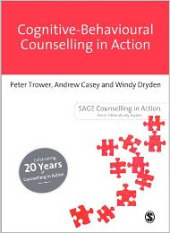Cognitive-behavioural Counselling in Action: Peter Trower, Andrew Casey & Windy Dryden
 The book is aimed at trainee counsellors who are developing the skills of cognitive behavioural counselling (CBC). It introduces the fundamentals of CBC and gives guidance on how to use CBC with a client. Some years ago I was lucky enough to receive training in how to use CBC with coaching clients, and I can see that this book does a superb job of explaining CBC and giving practical guidance in how to use it. Despite the fact that the cognitive-behavioural approach is variously described as cognitive-behavioural therapy or cognitive-behavioural counselling, you do not need to be either a therapist or a counsellor to use these techniques with coaching clients.
The book is aimed at trainee counsellors who are developing the skills of cognitive behavioural counselling (CBC). It introduces the fundamentals of CBC and gives guidance on how to use CBC with a client. Some years ago I was lucky enough to receive training in how to use CBC with coaching clients, and I can see that this book does a superb job of explaining CBC and giving practical guidance in how to use it. Despite the fact that the cognitive-behavioural approach is variously described as cognitive-behavioural therapy or cognitive-behavioural counselling, you do not need to be either a therapist or a counsellor to use these techniques with coaching clients.
CBC focuses on how a client’s thinking patterns may be holding him/her back. It does not explore early childhood experiences to discover why this thinking pattern has developed, but focuses instead on analysing and addressing those thinking errors today. The book talks about counselling. In this review, I’ll talk about coaching instead.
Key themes and ideas
The book makes the point that the task of the CBC coach is both to engage the client in the process of change in the coaching sessions and to teach the client the theory and method of change itself – i.e. to teach the client to do CBC by him/herself This fits perfectly with the idea that a coach should work actively to ensure that clients do not become dependent on him/her. The goal is to teach the client to become self-sufficient in his/her use of CBC – equipping him/her for life.
Three main assumptions are at the heart of CBC:
- What/how we think is what determines how we feel and how we behave
- A pattern of thinking that is negative or that does not reflect reality leads to the client having unhelpful feelings
- Changing a pattern of negative thinking allows the client to feel more positive about the situation and to take more appropriate action.
CBC is not about encouraging empty positive thinking, but is a way of helping the client to see reality more clearly and to be rational about the true impact of a situation.
As well as helping clients to assess specific situations or challenges, CBC offers tools for helping clients to work with their core beliefs so that, over time, they develop a set of beliefs which is more constructive for them.
Useful gems
- Questions are the best tool for helping a client to tackle his/her own thinking errors, and the CBC approach probes the client for evidence to support his/her view:
- How does it follow that…?
- What makes that terrible?
- How do you know that?
- Who says you must?
- What is the worst that could happen?
- What evidence do you have that…?
- How does that mean that….?
- What does it say about you if…?
- People are not so much disturbed by past events as by the way in which they view those events today.
Why I rate this book
- It’s very practical, giving step-by-step guidance to the way in which the CBC coaching relationship could develop
- It has lots of mini conversations between coach and client which demonstrate what the tool sounds like in practice
- There is a sprinkling of hard copy tools and tables for the coach to use with a client
- It is very easy to understand
- It gives coaches a tried and tested framework for helping clients to see things differently
- It helps coaches to guard against being drawn into taking a position and arguing for it against the client. CBC offers clear and structured questioning by which the coach can help the client to dispute his/her own thinking and to identify for him/herself any flaws in that thinking or the conclusions drawn from it.
 Visit Amazon for more reviews, and a competitive price. Cognitive-Behavioural Counselling in Action (Counselling in Action series) - Peter Trower, Andrew Casey & Windy Dryden.
Visit Amazon for more reviews, and a competitive price. Cognitive-Behavioural Counselling in Action (Counselling in Action series) - Peter Trower, Andrew Casey & Windy Dryden.
Paperback: 160 pages
Publisher: Sage Publications Ltd; illustrated edition edition (2 Aug 1988)
Language: English
ISBN-10: 0803980485
ISBN-13: 978-0803980488
Product Dimensions: 20.3 x 14.7 x 1.3 cm
 Share Article
Share Article